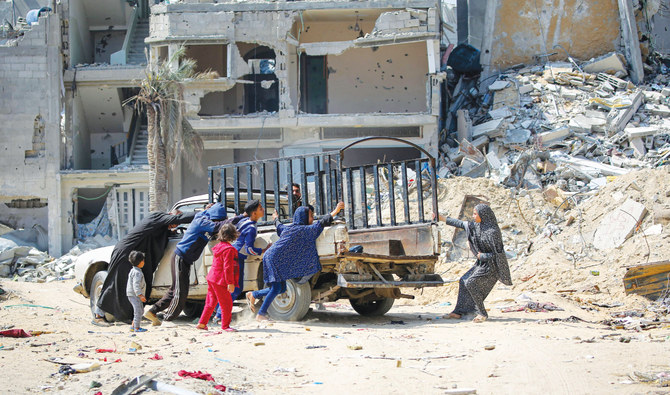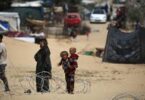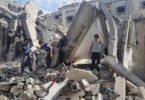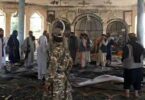GENEVA/CAIRO (Reuters) : Israeli tanks pushed back into some areas of the northern Gaza Strip on Tuesday which they had left weeks ago, while warplanes conducted airstrikes on Rafah, the Palestinians’ last refuge in the south of the territory, killing and wounding several people, medics and residents said.
Residents reported an internet outage in the areas of Beit Hanoun and Jabalia in northern Gaza.
Tanks advanced into Beit Hanoun and surrounded some schools where displaced families have taken refuge, said the residents and media outlets of the militant Palestinian group Hamas.
“Occupation soldiers ordered all families inside the schools and the nearby houses where the tanks had advanced to evacuate.
The soldiers detained many men,” one resident of northern Gaza said via a chat app.
Beit Hanoun, home to 60,000 people, was one of the first areas targeted by Israel’s ground offensive in Gaza last October.
Heavy bombardment turned most of Beit Hanoun, once known as “the basket of fruit” because of its orchards, into a ghost town comprising piles of rubble.
Many families who had returned to Beit Hanoun and Jabalia in recent weeks after Israeli forces withdrew, began moving out again on Tuesday because of the new raid, some residents said.
Palestinian health officials said in one strike, Israel killed four people and wounded several others in Rafah, where over half of Gaza’s 2.3 million people are sheltering and bracing for a planned Israeli ground offensive into the city, which borders Egypt.
The Israeli military said its forces continued to operate in the central Gaza Strip and that they had killed several gunmen who attempted to attack them.
“Furthermore, over the past day, IDF fighter jets and aircraft destroyed a missile launcher along with dozens of terrorist infrastructure, terror tunnels, and military compounds where armed Hamas terrorists were located,” it added.
In Al-Nusseirat refugee camp in the central Gaza Strip, residents said Israeli planes had bombed and destroyed four multi-story residential buildings on Tuesday.
Israel is still imposing “unlawful” restrictions on humanitarian relief for Gaza, the UN human rights office said on Tuesday, despite assertions from Israel and others that barriers have eased.
The amount of aid now entering Gaza is disputed, with Israel and Washington saying aid flows have risen in recent days but UN agencies say it is still far below bare minimum levels.
The Palestinian Health Ministry said 33,843 Palestinians have so far been killed by Israeli fire since Oct. 7, including 46 in the past 24 hours.
Israel is preventing UN investigators from speaking to witnesses and victims of the Oct. 7 attack, former UN rights chief Navi Pillay, who is chairing a three-person probe, said.
The unprecedented Commission of Inquiry was established by the UN Human Rights Council in May 2021 to investigate alleged violations of international humanitarian and human rights law in Israel and the Palestinian territories.
“I deplore the fact that people inside Israel who wish to speak to us are being denied that opportunity, because we cannot get access into Israel,” Pillay said.
The investigation briefed diplomats at the UN in Geneva on its work and said that since Oct. 7, it had focused on the Gaza war between Israel and Hamas.
“So far as the government of Israel is concerned, we have faced not merely a lack of cooperation but active obstruction of our efforts to receive evidence from Israeli witnesses and victims to the events that occurred in southern Israel,” said Chris Sidoti, one of the three members of the inquiry.
The Gaza war began with Hamas’s attack against Israel which resulted in the deaths of 1,170 people, mostly civilians, according to Israeli figures.
The militants also took about 250 hostages, of whom Israel estimates 129 remain in Gaza, including 34 who are presumed dead.
Pillay, 82, a South African former High Court judge, said the commission was investigating alleged crimes during the Hamas attack as well as some allegedly committed by Israeli forces in the Gaza Strip and in the West Bank.
Sidoti, speaking via video-link, said the investigation had found it difficult to collect evidence from large numbers of witnesses.







